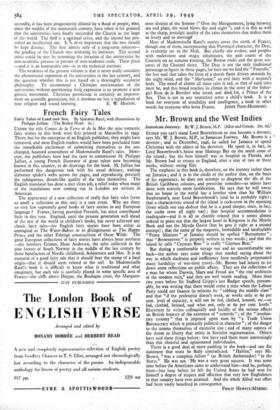Mr. Brown( and the West Indies
Jamaican Journey. By W. J. Brown, M.P. (Allen and Unwin. 10s. 6d.)
EITHER you can't stand Lord Beaverbrook or you become a devotee, says Mr. W. J. Brown, M.P., in Jamaican Tourney. Mr. Brown is a "' devotee ; and in December, 1946, he sailed for Jamaica to spend Christmas with the object of his devotion. He spent it, in fact, in Lord Beaverbrook's house near Montego. Bay on the north coast of the island ; but his host himself was in hospital in Florida, and Mr. Brown had to return to England, after a stay of two or three weeks, without seeing Illin.
The emphasis in this book is, therefore, on the journey rather than on Jamaica ; and it is to the credit of the author that, on the basis of his experience, he does not attempt to diagnose the ills of the British Caribbean colonies, and prescribe remedies—as others have done with scarcely more justification. He says that he will swear that no house in the world has a lovelier view than Sir William Stephenson's, near Lord Beaverbrook's (and he is probably right) ; that a characteristic sound of the island is cock-crow in the morning (from which one can deduce that he is a good sleeper, since, in fact, the cocks crow all night too) ; that hospital accommodation is inadequate—and it is all so chattily related that it seems almost unkind to point out that the largest hotel in Kingston is the Myrtle Bank and not the Myrtle Grove (but he gets it right at a second attempt) ' • that the name pf the magnetic, formidable and incalculable " Prime Minister " of -/amaica should be spelled " Bustamente " ; that " Brownstown " is properly written in two words ; and that the island he calls " Cayman Brae " is really " Cayman Brae."
But during a comfortable voyage out and an uncomfortable one back—the author says some things that needed saying about the way in which slaCkness 'and inefficiency have needlessly perpetuated many hardships of war-time travel—Mr. Brown had leisure to, jot down some reflections on public affairs. They are the reflections of a man for whom Darwin, Marx and Freud are " the real architects of the modern ruin," and they are well worth reading. More than two years before Sir Stafford Cripps's last Budget speeCh, preaum- ably, he was writing that there would come a time when the Labour Party could not finance its reforms by " robbing the middle class " and that "if the proletariat doesn't-work, or works only at 6o per cent. level of capacity, it will not be fed, clothed, housed, etc.—or fed, clothed, housed, and what not, only at 6o per cent. levels." Elsewhere he .writes colloquially and lucidly of the serious effects on British honesty of the existence of " controls " ; of the " involun- tary tyranny " that is imposed upon men by " a Trade Union Bureaucracy which is primarily political in character " ; of the danger to the unions themselves of excessive size ; and of many aspects of the threat to liberty that exists in Socialist regimentation. Others have said these things before : few have-said them more interestingly than this cheerful and opinionated individualist.
There is a good deal of mere padding in the book—and one flat statement that must' be flatly contradicted. "Halifax," says Mr: Brown, " was a complete-failure " (as British Ambassador) " in the States." He was not. 'He was a very great success. It was some time before the Americans came to understand him—and he, perhaps, them—but- long before he left the United States he had won for himself a degree of respect and affection that very few Englishmen in that country have ever attained. And the whole Allied war effort had been vastly benefited in consequence.
PHILIP HEWITT7MYRING.


































 Previous page
Previous page